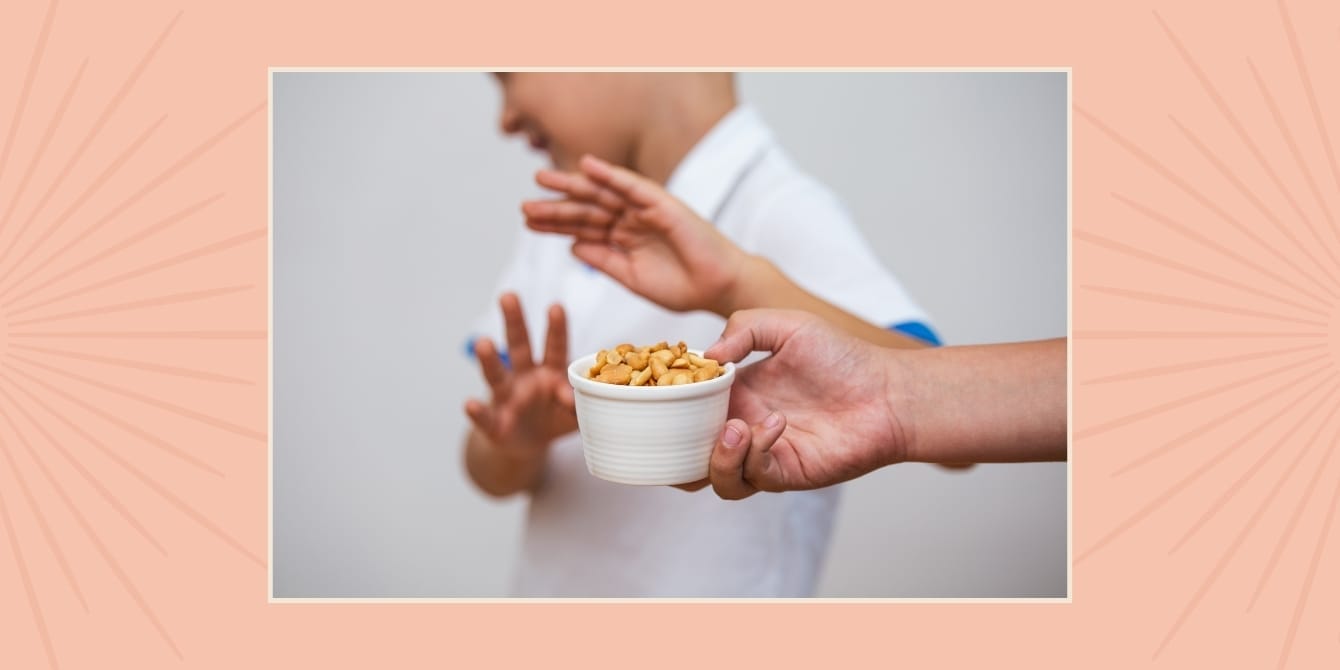For many parents, a peanut allergy diagnosis means a lifetime of label-checking, food anxiety, and careful meal planning—along with the challenge of navigating school, playdates, and social events with confidence and safety in mind. But a new study offers a glimmer of hope: researchers found that a simple, gradual exposure to peanuts helped children with peanut allergies build tolerance—enough to handle three tablespoons of peanut butter without a reaction.
Not all peanut allergies are the same
Peanut allergies affect about 2% of U.S. children, with severity ranging from extreme sensitivity to small traces to a higher threshold where kids can tolerate at least half a peanut but remain allergic. An estimated 800,000 children fall into this high-threshold category, yet their only option has been strict avoidance—effective for prevention but not for building tolerance.
A new approach for kids with peanut allergies
A groundbreaking NIH-funded study, published in NEJM Evidence, set out to change that. Researchers tested a simple, home-based peanut exposure therapy to safely increase tolerance without requiring complex, clinic-based treatments. Unlike existing FDA-approved treatments that cater to children with low-threshold peanut allergy, this approach specifically addresses a gap in care for kids who fall in between.
For parents of these children, the findings could be life-changing. By carefully increasing peanut intake over time under medical supervision, 100% of the children in the treatment group successfully built a higher tolerance to peanut protein. This suggests a new, low-cost, and accessible way to help manage peanut allergies—one that could ease anxiety and open up new possibilities for affected families. While these results are promising, experts emphasize that every child’s response to treatment can vary. Consulting with a doctor is essential before considering any changes in allergy management.
Related: Baby gut health is a powerful tool when it comes to allergies and eczema
The study: A promising step forward
To test this approach, researchers at Mount Sinai Kravis Children’s Hospital conducted a mid-stage clinical trial involving 73 children, ages 4 to 14, with high-threshold peanut allergies. Participants were split into two groups:
- Peanut-ingestion group: These children started with 1/8 teaspoon of peanut butter daily and gradually increased their intake every eight weeks under medical supervision.
- Avoidance group: These children continued avoiding peanuts, following standard allergy management practices.
Over 18 months, children in the peanut-ingestion group significantly increased their tolerance. None experienced severe allergic reactions at home, and only one child required epinephrine during a supervised dose increase at the study site. While this suggests that gradual exposure may be a safe and effective strategy for managing peanut allergies, parents of children with severe allergies may still have concerns. Experts emphasize that any approach involving allergen exposure should always be conducted under strict medical supervision to ensure safety.
Related: How to expertly manage your child’s food allergies during events and holidays—and have peace of mind
The results: Increased tolerance and sustained benefits
By the end of the study, the results were striking:
- 100% of children in the peanut-ingestion group tolerated 9 grams of peanut protein (equivalent to three tablespoons of peanut butter) without a reaction.
- In contrast, only 10% of children in the avoidance group reached the same level of tolerance.
After continuing weekly peanut consumption for 16 weeks, followed by an eight-week peanut-free period, 87% of children in the peanut-ingestion group retained their tolerance—suggesting lasting benefits.
Related: Early exposure to peanuts can prevent peanut allergies in babies, AAP says
What this means for families managing peanut allergies
For families managing peanut allergies, these findings offer a new sense of hope. While peanut avoidance has long been the standard approach, this study suggests that gradual, medically supervised exposure could help children build tolerance, reducing the risk of severe reactions and easing dietary restrictions.
According to lead researcher Dr. Scott Sicherer, director of the Elliot and Roslyn Jaffe Food Allergy Institute, the findings are especially promising because they provide an option for a group of children who were previously left out of allergy treatment trials. “This approach offers a simple, accessible, and low-cost way to help children with high-threshold peanut allergy build tolerance in a controlled manner,” Sicherer explains.
While more research is needed to understand the long-term effects, this study presents a potential shift in how peanut allergies are managed.
What’s next? Expanding research beyond peanuts
This promising study raises the question: Could this method work for other food allergies? Researchers hope to explore:
- Long-term tolerance: How well children maintain their peanut tolerance years after treatment.
- Other allergens: Whether gradual exposure could help kids with tree nut, egg, or milk allergies.
- Broader accessibility: Ways to make this approach easier for families to adopt with physician guidance.
As more studies emerge, experts hope that oral immunotherapy could provide greater freedom and safety for food-allergic children and their families. In the meantime, parents interested in this approach should consult with their child’s allergist before making any dietary changes.
For families navigating peanut allergies, this research offers a promising step forward. While peanut avoidance has been the go-to strategy for years, a future where kids can safely enjoy peanut butter without fear may be closer than ever.
Sources:
- Trends in peanut allergies among children. National Center for Biotechnology Information. 2014. “Peanut allergy prevalence among school-age children in a US cohort not selected for any disease.”
- New treatment for peanut allergies in children. National Institutes of Health. 2025.“Therapy helps peanut-allergic kids tolerate tablespoons of peanut butter.”

